BUACC5933 Sem2 2019: CSR, Sustainability, Accounting Profession
VerifiedAdded on 2022/10/11
|6
|1282
|12
Report
AI Summary
This report analyzes the stance and initiatives of the Australian accounting profession, particularly CPA Australia and ICAA, on corporate social responsibility (CSR) and sustainability. It explores the evolution of CSR, the role of Environmental Management Accounting (EMA), and sustainability reporting. The report details various initiatives undertaken by these professional bodies, such as adopting standards like ISO 14001 and promoting sustainability reporting in financial statements. The report further emphasizes the collaborative efforts of CPA Australia and ICAA in improving CSR reporting, highlighting the increasing importance of CSR activities in financial statements and the significance of EMA in accounting for environmental costs. The report also discusses the role of accountants in CSR reporting and the increasing focus on sustainable practices driven by the 'go-green' movement. The assignment brief required a discussion on BHP Billiton's CSR practices, and the report incorporates references to demonstrate social and environmental accountability as well.
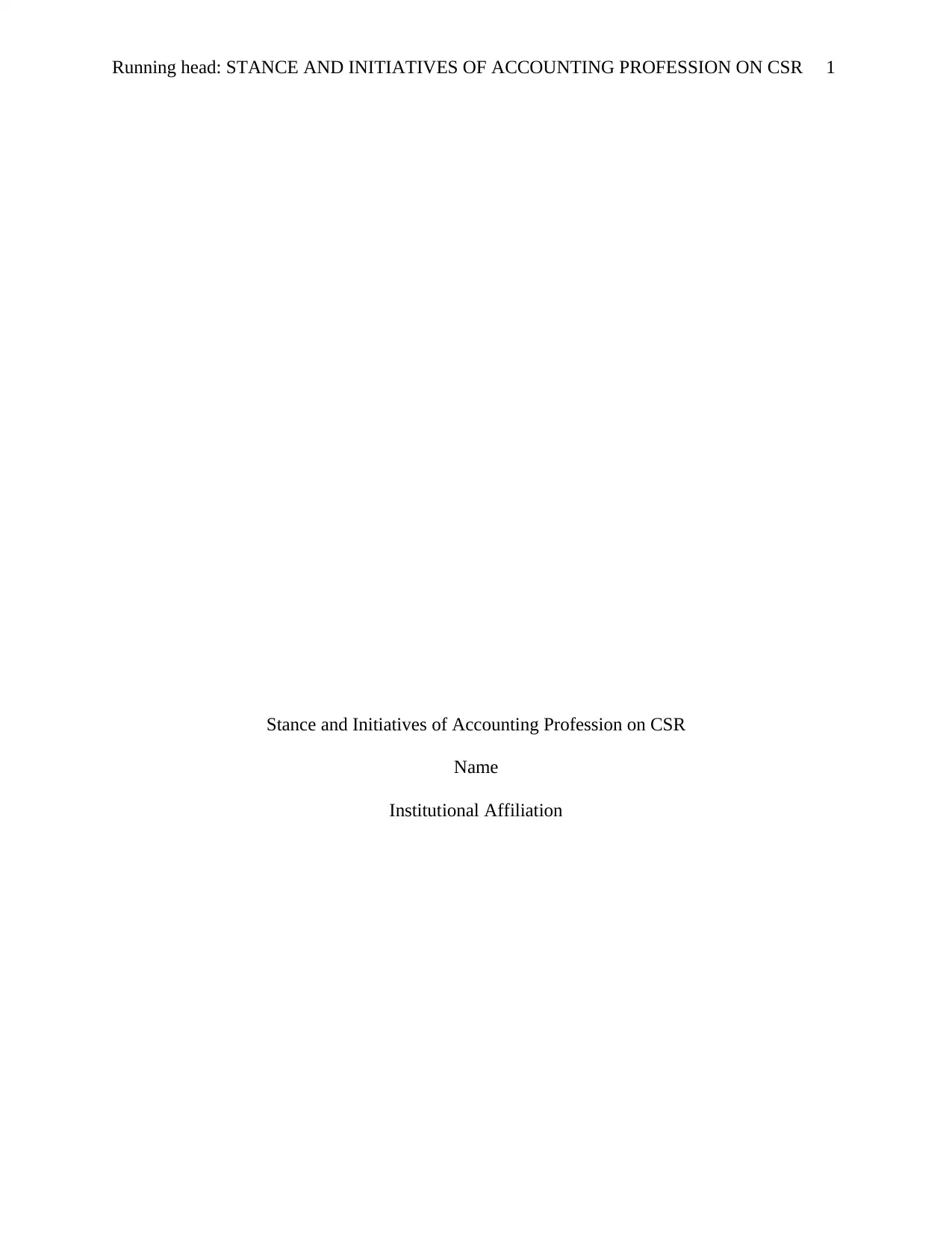
Running head: STANCE AND INITIATIVES OF ACCOUNTING PROFESSION ON CSR 1
Stance and Initiatives of Accounting Profession on CSR
Name
Institutional Affiliation
Stance and Initiatives of Accounting Profession on CSR
Name
Institutional Affiliation
Paraphrase This Document
Need a fresh take? Get an instant paraphrase of this document with our AI Paraphraser
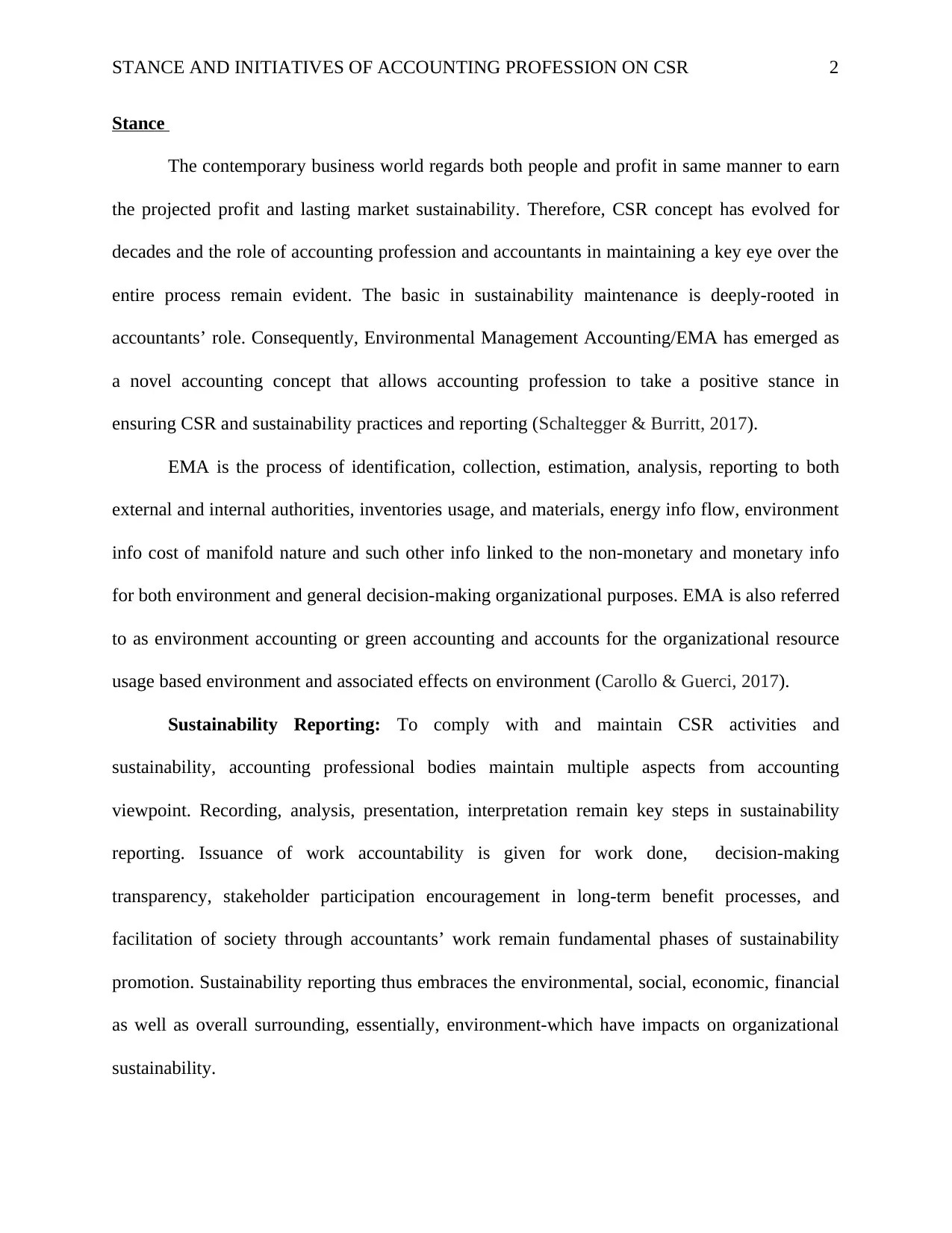
STANCE AND INITIATIVES OF ACCOUNTING PROFESSION ON CSR 2
Stance
The contemporary business world regards both people and profit in same manner to earn
the projected profit and lasting market sustainability. Therefore, CSR concept has evolved for
decades and the role of accounting profession and accountants in maintaining a key eye over the
entire process remain evident. The basic in sustainability maintenance is deeply-rooted in
accountants’ role. Consequently, Environmental Management Accounting/EMA has emerged as
a novel accounting concept that allows accounting profession to take a positive stance in
ensuring CSR and sustainability practices and reporting (Schaltegger & Burritt, 2017).
EMA is the process of identification, collection, estimation, analysis, reporting to both
external and internal authorities, inventories usage, and materials, energy info flow, environment
info cost of manifold nature and such other info linked to the non-monetary and monetary info
for both environment and general decision-making organizational purposes. EMA is also referred
to as environment accounting or green accounting and accounts for the organizational resource
usage based environment and associated effects on environment (Carollo & Guerci, 2017).
Sustainability Reporting: To comply with and maintain CSR activities and
sustainability, accounting professional bodies maintain multiple aspects from accounting
viewpoint. Recording, analysis, presentation, interpretation remain key steps in sustainability
reporting. Issuance of work accountability is given for work done, decision-making
transparency, stakeholder participation encouragement in long-term benefit processes, and
facilitation of society through accountants’ work remain fundamental phases of sustainability
promotion. Sustainability reporting thus embraces the environmental, social, economic, financial
as well as overall surrounding, essentially, environment-which have impacts on organizational
sustainability.
Stance
The contemporary business world regards both people and profit in same manner to earn
the projected profit and lasting market sustainability. Therefore, CSR concept has evolved for
decades and the role of accounting profession and accountants in maintaining a key eye over the
entire process remain evident. The basic in sustainability maintenance is deeply-rooted in
accountants’ role. Consequently, Environmental Management Accounting/EMA has emerged as
a novel accounting concept that allows accounting profession to take a positive stance in
ensuring CSR and sustainability practices and reporting (Schaltegger & Burritt, 2017).
EMA is the process of identification, collection, estimation, analysis, reporting to both
external and internal authorities, inventories usage, and materials, energy info flow, environment
info cost of manifold nature and such other info linked to the non-monetary and monetary info
for both environment and general decision-making organizational purposes. EMA is also referred
to as environment accounting or green accounting and accounts for the organizational resource
usage based environment and associated effects on environment (Carollo & Guerci, 2017).
Sustainability Reporting: To comply with and maintain CSR activities and
sustainability, accounting professional bodies maintain multiple aspects from accounting
viewpoint. Recording, analysis, presentation, interpretation remain key steps in sustainability
reporting. Issuance of work accountability is given for work done, decision-making
transparency, stakeholder participation encouragement in long-term benefit processes, and
facilitation of society through accountants’ work remain fundamental phases of sustainability
promotion. Sustainability reporting thus embraces the environmental, social, economic, financial
as well as overall surrounding, essentially, environment-which have impacts on organizational
sustainability.
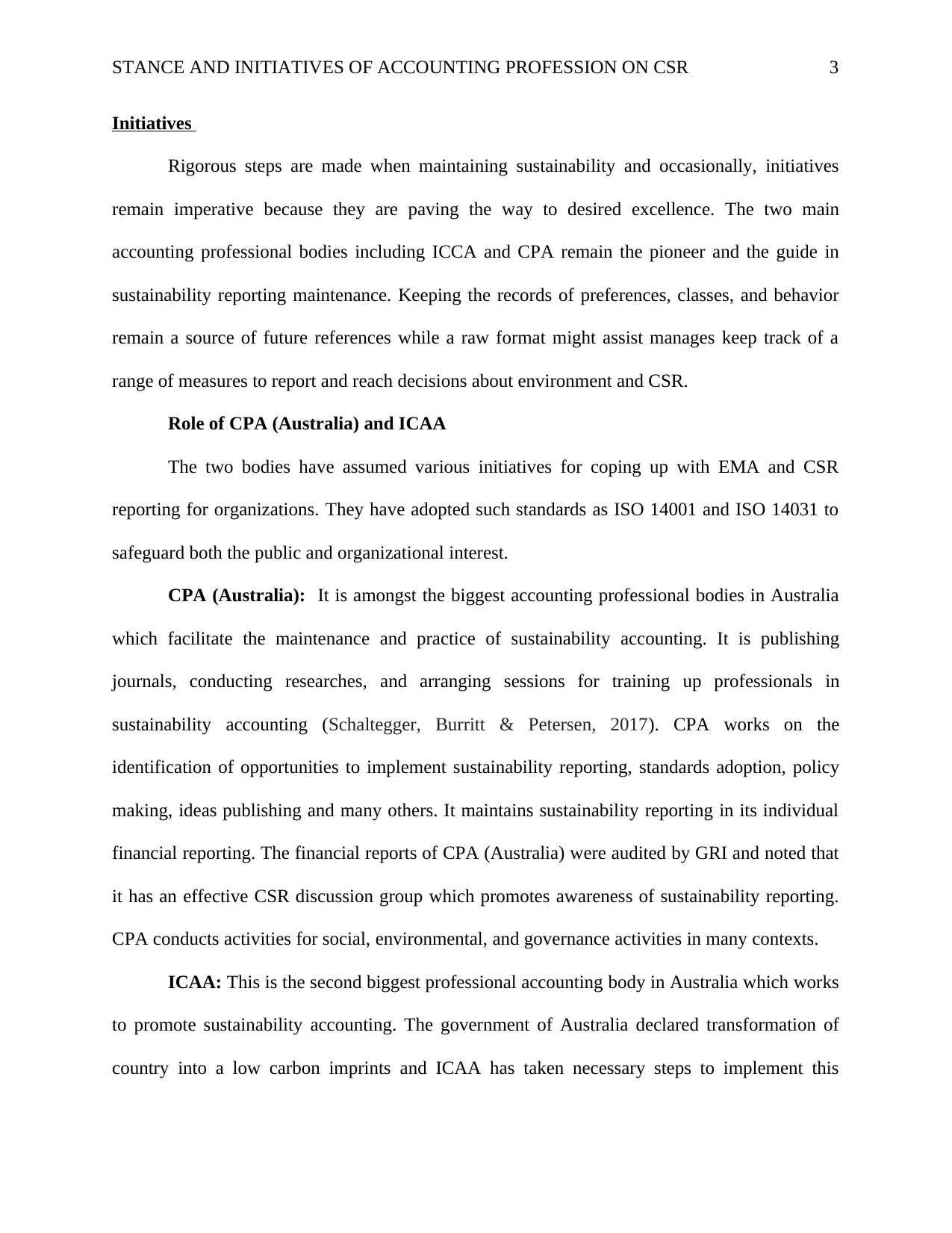
STANCE AND INITIATIVES OF ACCOUNTING PROFESSION ON CSR 3
Initiatives
Rigorous steps are made when maintaining sustainability and occasionally, initiatives
remain imperative because they are paving the way to desired excellence. The two main
accounting professional bodies including ICCA and CPA remain the pioneer and the guide in
sustainability reporting maintenance. Keeping the records of preferences, classes, and behavior
remain a source of future references while a raw format might assist manages keep track of a
range of measures to report and reach decisions about environment and CSR.
Role of CPA (Australia) and ICAA
The two bodies have assumed various initiatives for coping up with EMA and CSR
reporting for organizations. They have adopted such standards as ISO 14001 and ISO 14031 to
safeguard both the public and organizational interest.
CPA (Australia): It is amongst the biggest accounting professional bodies in Australia
which facilitate the maintenance and practice of sustainability accounting. It is publishing
journals, conducting researches, and arranging sessions for training up professionals in
sustainability accounting (Schaltegger, Burritt & Petersen, 2017). CPA works on the
identification of opportunities to implement sustainability reporting, standards adoption, policy
making, ideas publishing and many others. It maintains sustainability reporting in its individual
financial reporting. The financial reports of CPA (Australia) were audited by GRI and noted that
it has an effective CSR discussion group which promotes awareness of sustainability reporting.
CPA conducts activities for social, environmental, and governance activities in many contexts.
ICAA: This is the second biggest professional accounting body in Australia which works
to promote sustainability accounting. The government of Australia declared transformation of
country into a low carbon imprints and ICAA has taken necessary steps to implement this
Initiatives
Rigorous steps are made when maintaining sustainability and occasionally, initiatives
remain imperative because they are paving the way to desired excellence. The two main
accounting professional bodies including ICCA and CPA remain the pioneer and the guide in
sustainability reporting maintenance. Keeping the records of preferences, classes, and behavior
remain a source of future references while a raw format might assist manages keep track of a
range of measures to report and reach decisions about environment and CSR.
Role of CPA (Australia) and ICAA
The two bodies have assumed various initiatives for coping up with EMA and CSR
reporting for organizations. They have adopted such standards as ISO 14001 and ISO 14031 to
safeguard both the public and organizational interest.
CPA (Australia): It is amongst the biggest accounting professional bodies in Australia
which facilitate the maintenance and practice of sustainability accounting. It is publishing
journals, conducting researches, and arranging sessions for training up professionals in
sustainability accounting (Schaltegger, Burritt & Petersen, 2017). CPA works on the
identification of opportunities to implement sustainability reporting, standards adoption, policy
making, ideas publishing and many others. It maintains sustainability reporting in its individual
financial reporting. The financial reports of CPA (Australia) were audited by GRI and noted that
it has an effective CSR discussion group which promotes awareness of sustainability reporting.
CPA conducts activities for social, environmental, and governance activities in many contexts.
ICAA: This is the second biggest professional accounting body in Australia which works
to promote sustainability accounting. The government of Australia declared transformation of
country into a low carbon imprints and ICAA has taken necessary steps to implement this
⊘ This is a preview!⊘
Do you want full access?
Subscribe today to unlock all pages.

Trusted by 1+ million students worldwide
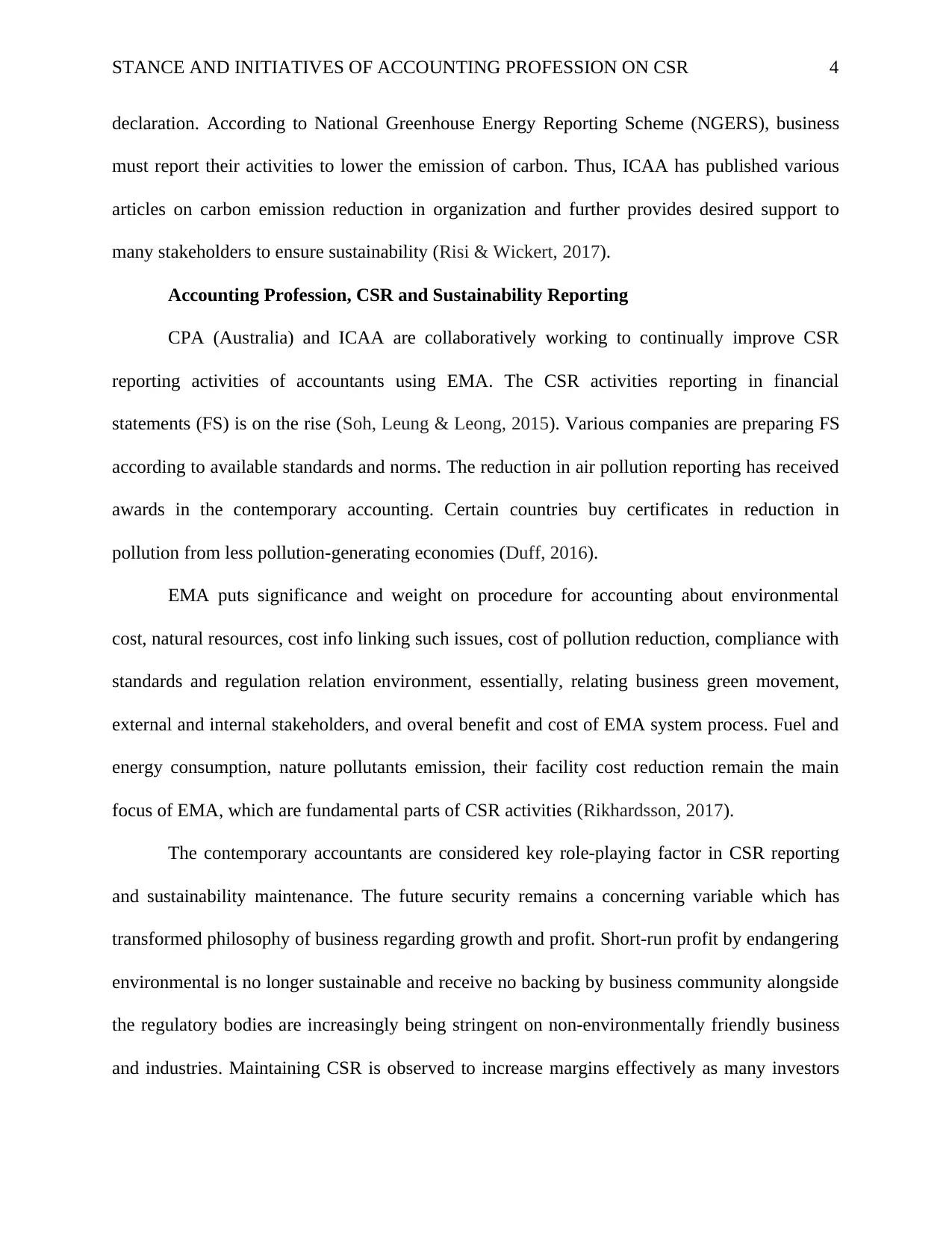
STANCE AND INITIATIVES OF ACCOUNTING PROFESSION ON CSR 4
declaration. According to National Greenhouse Energy Reporting Scheme (NGERS), business
must report their activities to lower the emission of carbon. Thus, ICAA has published various
articles on carbon emission reduction in organization and further provides desired support to
many stakeholders to ensure sustainability (Risi & Wickert, 2017).
Accounting Profession, CSR and Sustainability Reporting
CPA (Australia) and ICAA are collaboratively working to continually improve CSR
reporting activities of accountants using EMA. The CSR activities reporting in financial
statements (FS) is on the rise (Soh, Leung & Leong, 2015). Various companies are preparing FS
according to available standards and norms. The reduction in air pollution reporting has received
awards in the contemporary accounting. Certain countries buy certificates in reduction in
pollution from less pollution-generating economies (Duff, 2016).
EMA puts significance and weight on procedure for accounting about environmental
cost, natural resources, cost info linking such issues, cost of pollution reduction, compliance with
standards and regulation relation environment, essentially, relating business green movement,
external and internal stakeholders, and overal benefit and cost of EMA system process. Fuel and
energy consumption, nature pollutants emission, their facility cost reduction remain the main
focus of EMA, which are fundamental parts of CSR activities (Rikhardsson, 2017).
The contemporary accountants are considered key role-playing factor in CSR reporting
and sustainability maintenance. The future security remains a concerning variable which has
transformed philosophy of business regarding growth and profit. Short-run profit by endangering
environmental is no longer sustainable and receive no backing by business community alongside
the regulatory bodies are increasingly being stringent on non-environmentally friendly business
and industries. Maintaining CSR is observed to increase margins effectively as many investors
declaration. According to National Greenhouse Energy Reporting Scheme (NGERS), business
must report their activities to lower the emission of carbon. Thus, ICAA has published various
articles on carbon emission reduction in organization and further provides desired support to
many stakeholders to ensure sustainability (Risi & Wickert, 2017).
Accounting Profession, CSR and Sustainability Reporting
CPA (Australia) and ICAA are collaboratively working to continually improve CSR
reporting activities of accountants using EMA. The CSR activities reporting in financial
statements (FS) is on the rise (Soh, Leung & Leong, 2015). Various companies are preparing FS
according to available standards and norms. The reduction in air pollution reporting has received
awards in the contemporary accounting. Certain countries buy certificates in reduction in
pollution from less pollution-generating economies (Duff, 2016).
EMA puts significance and weight on procedure for accounting about environmental
cost, natural resources, cost info linking such issues, cost of pollution reduction, compliance with
standards and regulation relation environment, essentially, relating business green movement,
external and internal stakeholders, and overal benefit and cost of EMA system process. Fuel and
energy consumption, nature pollutants emission, their facility cost reduction remain the main
focus of EMA, which are fundamental parts of CSR activities (Rikhardsson, 2017).
The contemporary accountants are considered key role-playing factor in CSR reporting
and sustainability maintenance. The future security remains a concerning variable which has
transformed philosophy of business regarding growth and profit. Short-run profit by endangering
environmental is no longer sustainable and receive no backing by business community alongside
the regulatory bodies are increasingly being stringent on non-environmentally friendly business
and industries. Maintaining CSR is observed to increase margins effectively as many investors
Paraphrase This Document
Need a fresh take? Get an instant paraphrase of this document with our AI Paraphraser
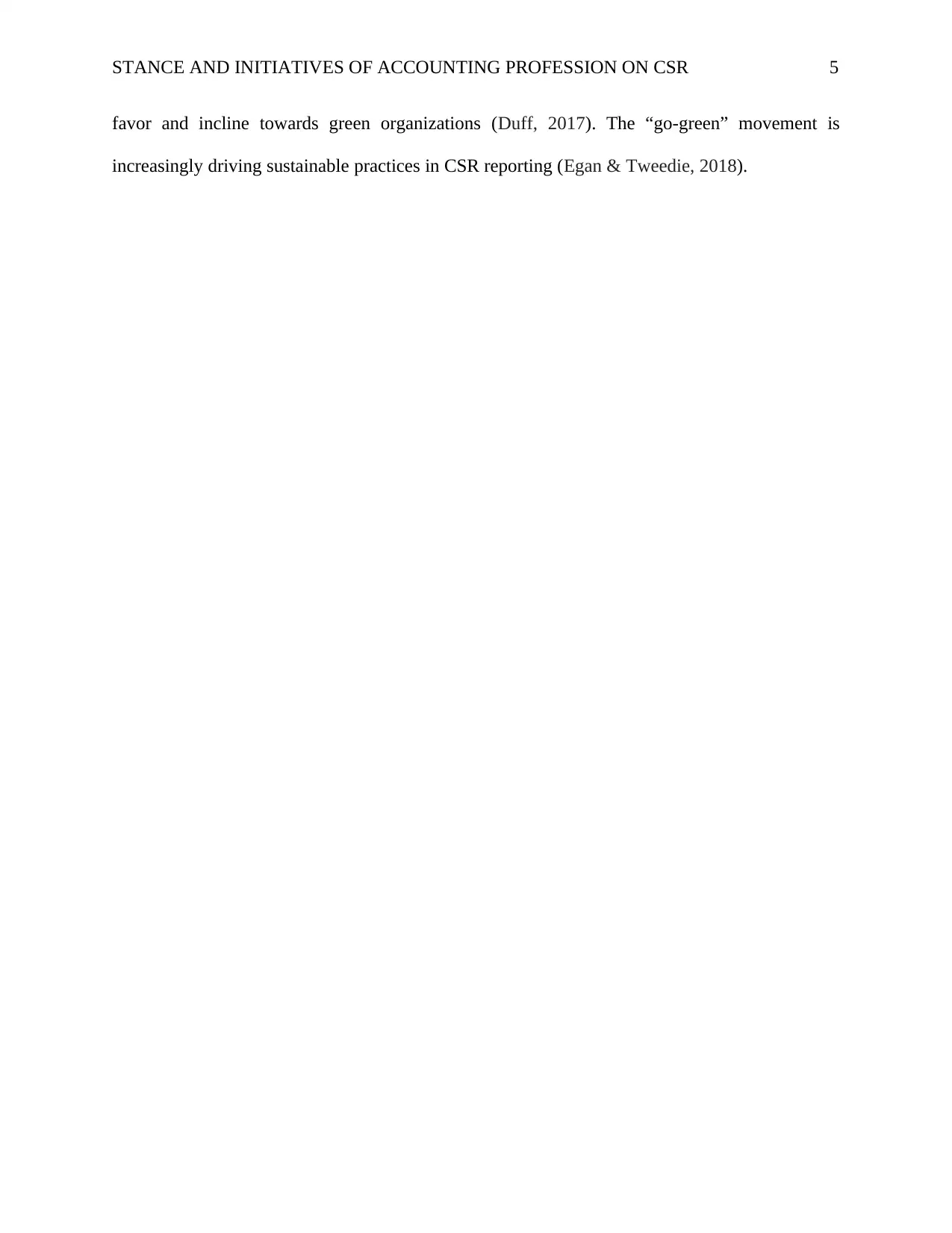
STANCE AND INITIATIVES OF ACCOUNTING PROFESSION ON CSR 5
favor and incline towards green organizations (Duff, 2017). The “go-green” movement is
increasingly driving sustainable practices in CSR reporting (Egan & Tweedie, 2018).
favor and incline towards green organizations (Duff, 2017). The “go-green” movement is
increasingly driving sustainable practices in CSR reporting (Egan & Tweedie, 2018).
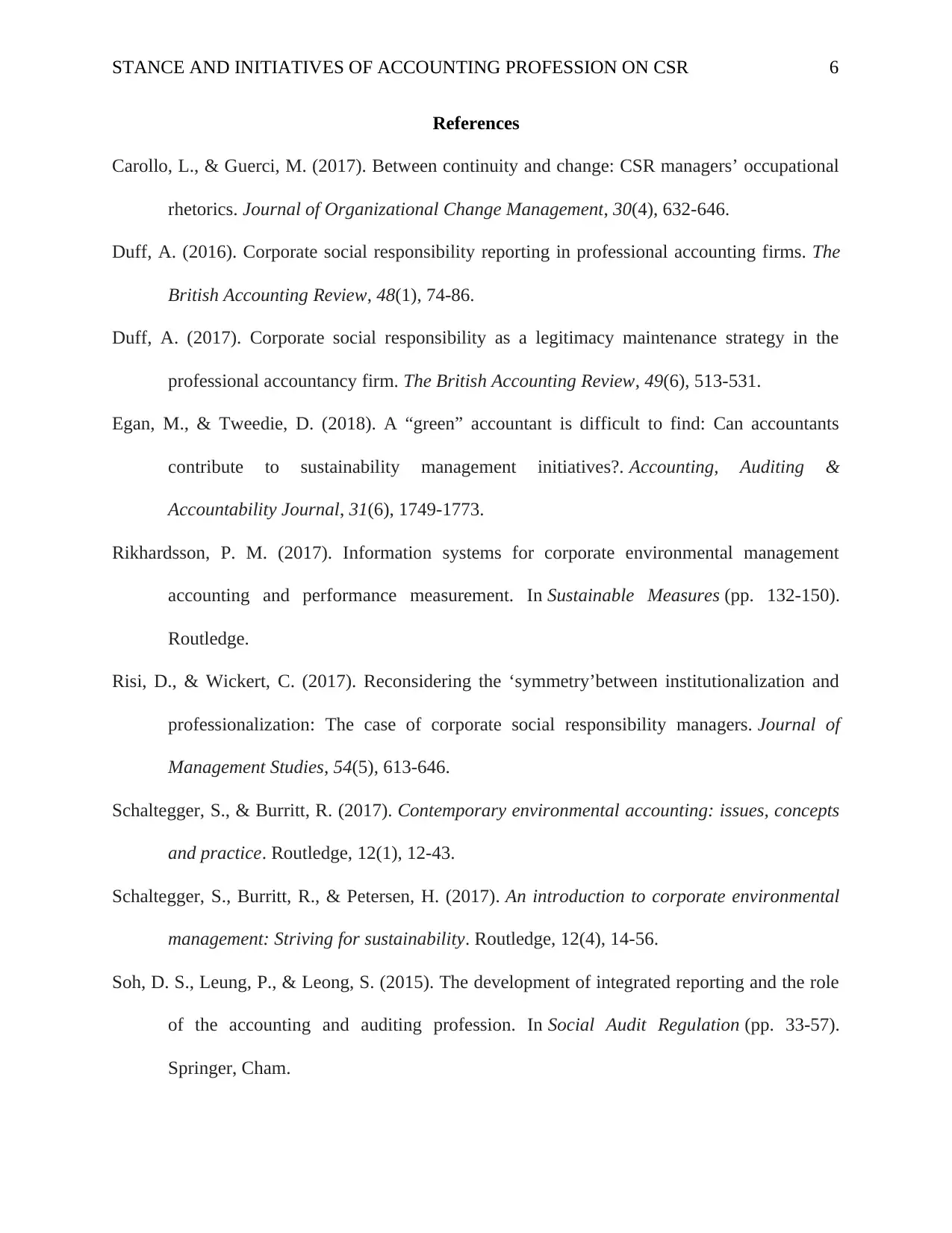
STANCE AND INITIATIVES OF ACCOUNTING PROFESSION ON CSR 6
References
Carollo, L., & Guerci, M. (2017). Between continuity and change: CSR managers’ occupational
rhetorics. Journal of Organizational Change Management, 30(4), 632-646.
Duff, A. (2016). Corporate social responsibility reporting in professional accounting firms. The
British Accounting Review, 48(1), 74-86.
Duff, A. (2017). Corporate social responsibility as a legitimacy maintenance strategy in the
professional accountancy firm. The British Accounting Review, 49(6), 513-531.
Egan, M., & Tweedie, D. (2018). A “green” accountant is difficult to find: Can accountants
contribute to sustainability management initiatives?. Accounting, Auditing &
Accountability Journal, 31(6), 1749-1773.
Rikhardsson, P. M. (2017). Information systems for corporate environmental management
accounting and performance measurement. In Sustainable Measures (pp. 132-150).
Routledge.
Risi, D., & Wickert, C. (2017). Reconsidering the ‘symmetry’between institutionalization and
professionalization: The case of corporate social responsibility managers. Journal of
Management Studies, 54(5), 613-646.
Schaltegger, S., & Burritt, R. (2017). Contemporary environmental accounting: issues, concepts
and practice. Routledge, 12(1), 12-43.
Schaltegger, S., Burritt, R., & Petersen, H. (2017). An introduction to corporate environmental
management: Striving for sustainability. Routledge, 12(4), 14-56.
Soh, D. S., Leung, P., & Leong, S. (2015). The development of integrated reporting and the role
of the accounting and auditing profession. In Social Audit Regulation (pp. 33-57).
Springer, Cham.
References
Carollo, L., & Guerci, M. (2017). Between continuity and change: CSR managers’ occupational
rhetorics. Journal of Organizational Change Management, 30(4), 632-646.
Duff, A. (2016). Corporate social responsibility reporting in professional accounting firms. The
British Accounting Review, 48(1), 74-86.
Duff, A. (2017). Corporate social responsibility as a legitimacy maintenance strategy in the
professional accountancy firm. The British Accounting Review, 49(6), 513-531.
Egan, M., & Tweedie, D. (2018). A “green” accountant is difficult to find: Can accountants
contribute to sustainability management initiatives?. Accounting, Auditing &
Accountability Journal, 31(6), 1749-1773.
Rikhardsson, P. M. (2017). Information systems for corporate environmental management
accounting and performance measurement. In Sustainable Measures (pp. 132-150).
Routledge.
Risi, D., & Wickert, C. (2017). Reconsidering the ‘symmetry’between institutionalization and
professionalization: The case of corporate social responsibility managers. Journal of
Management Studies, 54(5), 613-646.
Schaltegger, S., & Burritt, R. (2017). Contemporary environmental accounting: issues, concepts
and practice. Routledge, 12(1), 12-43.
Schaltegger, S., Burritt, R., & Petersen, H. (2017). An introduction to corporate environmental
management: Striving for sustainability. Routledge, 12(4), 14-56.
Soh, D. S., Leung, P., & Leong, S. (2015). The development of integrated reporting and the role
of the accounting and auditing profession. In Social Audit Regulation (pp. 33-57).
Springer, Cham.
⊘ This is a preview!⊘
Do you want full access?
Subscribe today to unlock all pages.

Trusted by 1+ million students worldwide
1 out of 6
Related Documents
Your All-in-One AI-Powered Toolkit for Academic Success.
+13062052269
info@desklib.com
Available 24*7 on WhatsApp / Email
![[object Object]](/_next/static/media/star-bottom.7253800d.svg)
Unlock your academic potential
Copyright © 2020–2026 A2Z Services. All Rights Reserved. Developed and managed by ZUCOL.




